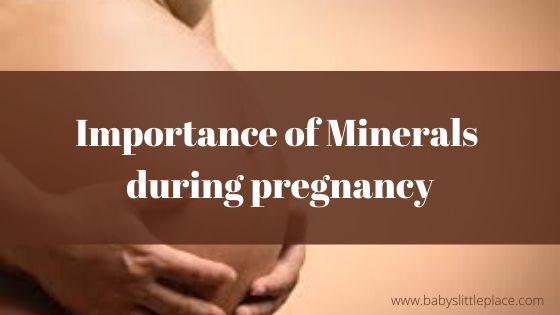
Importance of Minerals during pregnancy
Minerals are essential for many body functions. They have a similar role as vitamins in our body. Minerals are involved in blood formation and oxygen transfer. They participate in the formation of bones and teeth, muscle sensitivity, and nerve stimulation.
As the blood volume of pregnant women more than doubled, the need for minerals during pregnancy also increases.
It is important to consume them with healthy food. Of course, certain mineral supplements are safe during pregnancy. But overdose with some of them can be toxic, so take them with caution.
Talk to your health care provider before you start taking mineral or other food supplements!
Minerals are divided into macroelements and microelements
Macroelements:
- potassium
- sodium
- calcium
- magnesium
- phosphorus
- chlorine
Microelements:
- iron
- copper
- zinc
- chromium
- selenium
- nickel
- manganese
- molybdenum
Important minerals and their role in pregnancy

Calcium in pregnancy
During pregnancy, the absorption of calcium in the body increases. Calcium has an important function during pregnancy, as it is a basic mineral for building strong bones and teeth.
It is especially important during the last ten weeks of pregnancy, as your baby needs it even more for proper bone development. Experts advise that pregnant women should double the intake of calcium during this period!
Food with the highest calcium concentration:
- milk, yogurt, cheese
- green leafy vegetables
Calcium is more efficient with:
- vitamins: A, C, and D
- minerals: iron, magnesium, manganese, phosphorus
- unsaturated fatty acids
RELATED: Calcium supplements during pregnancy
Importance of magnesium during pregnancy
During the pregnancy magnesium helps to preserve and restore body tissues, it can reduce fetal growth restriction. Magnesium also prevents eclampsia and increases the weight of the fetus.
A severe lack of magnesium can lead to preeclampsia, baby’s anomalies, and even higher infant mortality.
The recommended magnesium intake for non-pregnant women is 280 mg, for pregnant women 300 mg and 350 mg for nursing moms.
Food with the highest magnesium concentration:
- oatmeal
- green leafy vegetables
- dried fruits, vegetables, cereals
- walnuts and dates
- meat
Magnesium is more efficient with:
- vitamins: B6, C, D and A
- minerals: calcium and phosphorus
- protein
Iron in pregnancy
Iron deficiency can lead to anemia, complications during pregnancy, and impact on the unborn baby as well.
Iron participates in the synthesis of hemoglobin, which is part of the red blood cells. Red blood cells are responsible for carrying oxygen throughout the body. If the concentration of hemoglobin in your body drop, anemia can occur.
The amount of women’s blood in pregnancy increases by as much as 40-50%, so the need for hemoglobin is higher too.
Food with the highest iron concentration:
- fish, red meat
- vegetables, soybeans, peaches
- cocoa, egg yolk
Iron is more efficient with:
- vitamins: C, B12, and B9
- minerals: phosphorus, copper, and calcium
RELATED ARTICLE: Top 10 iron-rich foods in pregnancy
Importance of zinc during pregnancy
Zinc is important for the DNA and cell formation of your baby. It is needed for cell division and tissue growth.
It is essential to take the recommended daily amount of 7 mg of zinc during pregnancy. Zinc deficiency in pregnancy is associated with abortion, premature birth, and can prolong the childbirth.
Food with the highest zinc concentration:
- sea fish
- mushrooms, oats, and wheat germ
- dry vegetables and fruits
Zinc is more efficient with:
- vitamins A, B6, D, and E
- minerals: calcium, copper, and phosphorus
Importance of selenium during pregnancy
Selenium plays a significant role in the undisturbed functioning of the reproductive system. It is involved in the proper nervous and immune system development of the fetus.
Deficiency can lead to miscarriage and gestational complications. Low concentration of selenium in the early stages of pregnancy also leads to the low birth weight of a newborn.
Food with the highest selenium concentration:
- rye, wheat germ
- onions and garlic
- eggs
- marine
- fruits
Selenium is more efficient with:
- vitamin E
Importance of copper during pregnancy
Copper is involved in forming red blood cells, so it is especially important during pregnancy when the volume of your blood doubles.
It helps in the development of a fetus’ skeletal and nervous system, and in the heart and blood vessels forming.
Food with the highest copper concentration:
- wheat germ, walnuts
- dried fruits and vegetables
- cereals and legumes
- cocoa
Copper is more efficient with:
- minerals: iron and zinc
Importance of phosphorus during pregnancy
Together with calcium, is phosphorus an integral part of bones and teeth, and also of each cell.
Due to the abundant intake with food, is the lack of phosphorus practically unknown. The recommended intake of phosphorus during pregnancy is 800mg / day.
Food with the highest phosphorus concentration:
- cheese
- oatmeal
- poultry
- sea fish
- walnuts and almonds
Phosphorus is more efficient with:
- vitamins D and A
- minerals: calcium and iron
- unsaturated fatty acids
Importance of potassium during pregnancy
Potassium has reduced typical pregnancy problems, such as feet swelling and water retention in the body. Daily potassium requirements are 1,5 g per day.
It is also important for sending nerve impulses and helping in muscle contraction.
Food with the highest potassium concentration:
- dried fruits: apricots, figs, dates, and plums
- tomato, banana, beans
Potassium is more efficient with:
- vitamins: A, C, and D
- minerals: iron, magnesium, manganese, and phosphorus
- unsaturated fatty acids
